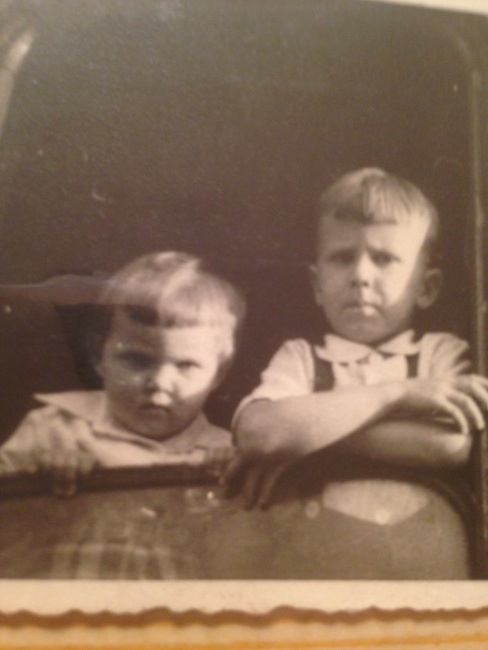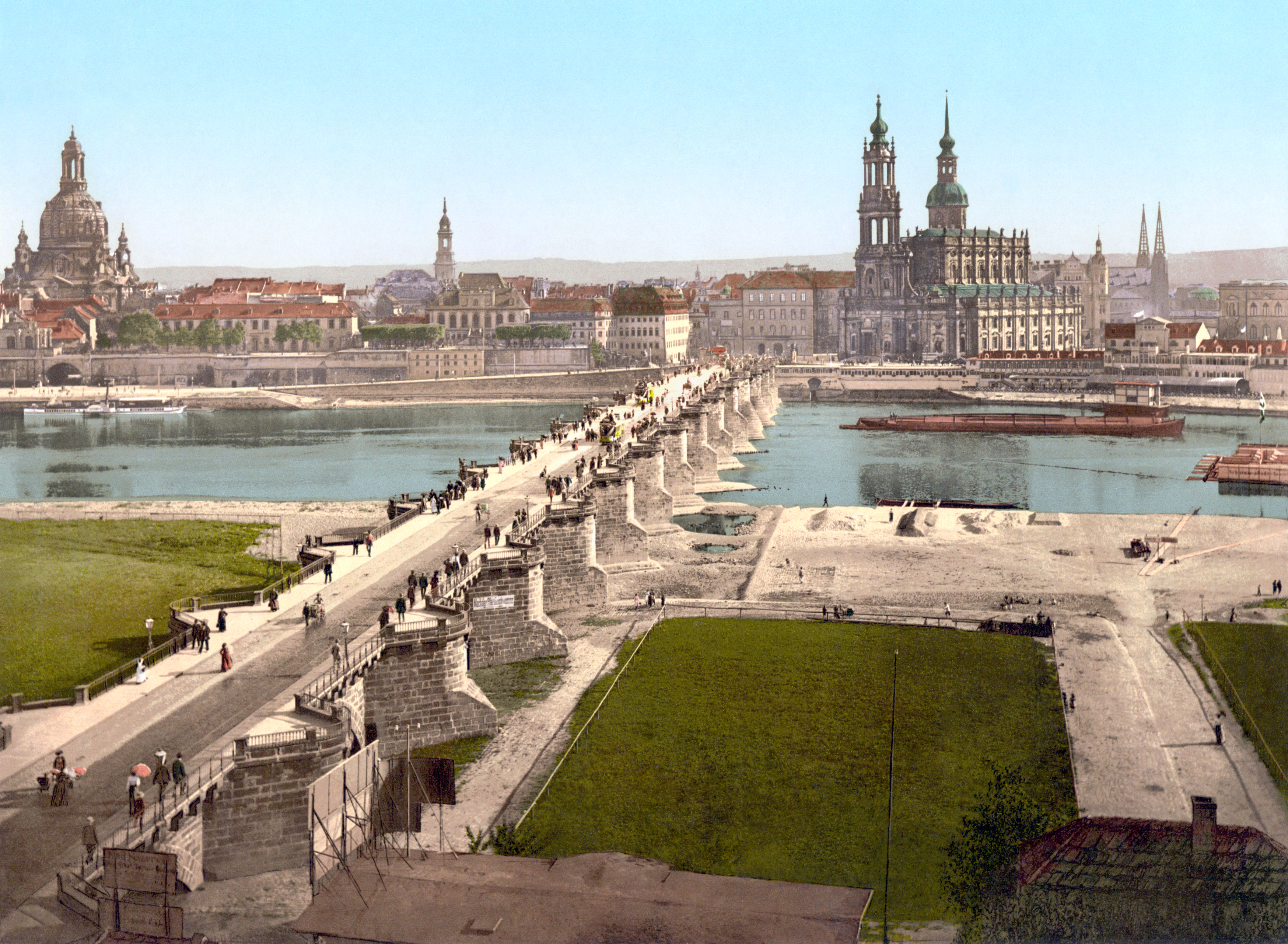
Irena, left, on a train, with an unnamed little boy.
February 13, 1945 found Anna and Irena in Dresden, Germany. Dresden was called “The Florence of the Elbe” and was regarded as one the world’s most beautiful cities for its architecture and museums. It was the seventh largest city in Germany and was an important industrial city, known for its china.
“Wake up, little one,” Anna said to Irena, shaking her softly. “We are going to Austria today. But first we need to go to the train station to get tickets.” Irena rubbed the sleep out of her eyes and rolled out of bed. Later that afternoon, they headed to the train station.
During the war, train stations were a constant hub of activity, teeming with people attempting to secure a limited number of train tickets. Because there was so much demand and so little supply, it was often very hard to get one ticket, let alone two.
They arrived together with their one suitcase between them. Anna found a large table at the station, so she hoisted their one piece of luggage up and laid it flat on the table, and then lifted Irena up so she was sitting on top of the suitcase.
“I need you up high so I can see you. Mommy is going to go wait in that line over there to try to get us tickets. Wait here for mama, ok?”
“Yes mama,” said Irena, looking at her with trusting blue eyes as she placed both hands on either side of her, touching the suitcase. “I will guard the suitcase.”
Anna got in a very long and slow line that eventually placed her around a corner and out of sight. There was nothing else for Irena to do but just sit there and watch people. Irena noticed that there were so many, many people at the train station that day, all of them rushing around. They seemed to be in a hurry.
Finally, Anna returned smiling, holding up two tickets. “We have tickets! Our train leaves in an hour.”
An hour later they boarded their train and headed out of the city. By now the sun had set and the countryside was dark and quiet. Irena yawned several times and then began to doze against her mother.
All of a sudden the same low, familiar rumble of bomber plane engines filled the night sky. The planes passed directly overhead. The train came to a complete stop and, just like the time on the refugee boats, all the lights went completely off, and the passengers were ordered to remain very quiet. The passengers all sat there quietly for a period of time.
“Mama!” Irena whispered to Anna. But Anna immediately put a finger to her lips and pointed out the window.
They both watched as the sky became a faint orange glow as Dresden, now very far away, was being firebombed from above by those same planes that had recently passed overhead. They could faintly hear the rumble of impact as bomb after bomb shook the land. Soon, the city was on fire and caught up in a complete firestorm; the orange glow could be seen for miles.
Between 25,000-35,000 people were killed that night in Dresden, many of them refugees, and most of them women, children, and older people. About 800 British and American plans dropped incendiary bombs filled with highly combustible chemicals such as napalm. Due to the firestorm, many people were actually sucked into the flames and burned alive.
But just a few passengers were safe on board a very dark and very quiet train outside of the doomed city.
“What is happening mama?” Irena whispered to her mother.
“The city is being destroyed,” she said softly. By the light of the orange glow Irena could see a tear spill over Anna’s cheek. Then Irena saw her mom bow her head and close her eyes and whisper something that Irena couldn’t hear.
The time was 10:14 pm. They had just left the train station a little after 8.
To read the conclusion of Anna’s story, click here: Escape from Latvia – Conclusion (Coming to America)
____________________________________________________
Author’s note: in conducting research for this post I learned that there were an unknown number of refugees in Dresden at the time of the Allied attack, so it is impossible to know exactly how many civilians perished. Estimates today range from 35,000 to 135,000. Looking at photographs of Dresden after the attack, in which the few buildings still standing are completely gutted, it seems improbable that only 35,000 of the million or so people in Dresden at the time were killed. Cellars and other shelters would have been meager protection against a firestorm that blew poisonous air heated to hundreds of degrees Fahrenheit across the city at hurricane-like speeds. At the end of the war, Dresden was so badly damaged that the city was basically leveled. click here.
Also: On the evening that Dresden was leveled, the US’s plan to initiate the bombing was delayed due to severe weather conditions and was instead fulfilled by the British Air Force. click here. My question is: was the plan to hit Dresden earlier that evening and then the British RAF was going to follow up after the first strike (this was often the pattern during the war)? I wasn’t able to find this information in my research, but I am glad that weather delayed the first part of the attack. I believe it’s possible that the bombings could’ve started earlier than 10:14 pm. Either way, I am truly grateful for the miracle that occurred for my husband’s mom and grandmother!
Dresden before WWII
Dresden after WWII



Thank you for this story! I just found out that my mother, my aunt and my grandma were on the same train and that my aunt (7 years old at that time) shared more or less the same memories with me.
LikeLiked by 1 person
Dear JSH – thank you for reading and commenting! What a miracle that our moms, aunts and grandmothers were together. A miracle of God!!
LikeLike
Yes, the family line could have ended there and none of us would be here now to read and write and reflect upon history and life…
LikeLiked by 1 person
Pingback: Escape from Latvia Part IV — Bombings and Miracles in Germany – Permission 2 Speak Freely
Pingback: Escape from Latvia -Anna’s story, Part I – Permission 2 Speak Freely
War is war, as is so painfully evident here, Heather, and there are no “winners.” These family anecdotes are important history, too. Thank you for sharing, and taking up the torch passed from generations before you.
LikeLiked by 1 person
Wow! Sounds like a miracle that they made it out in time!
God’s plans, right? Truly amazing!!!
LikeLiked by 1 person
the before and after photos of the city are sobering. Thank you for sharing Heather!
LikeLiked by 1 person